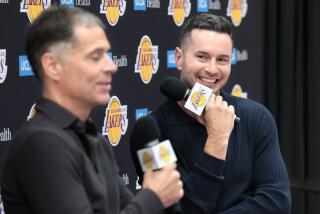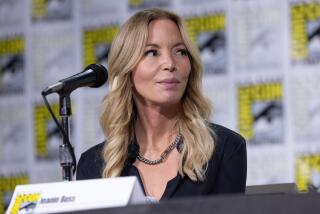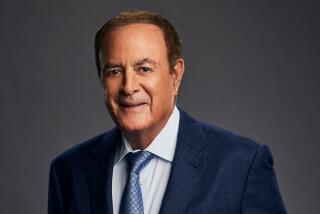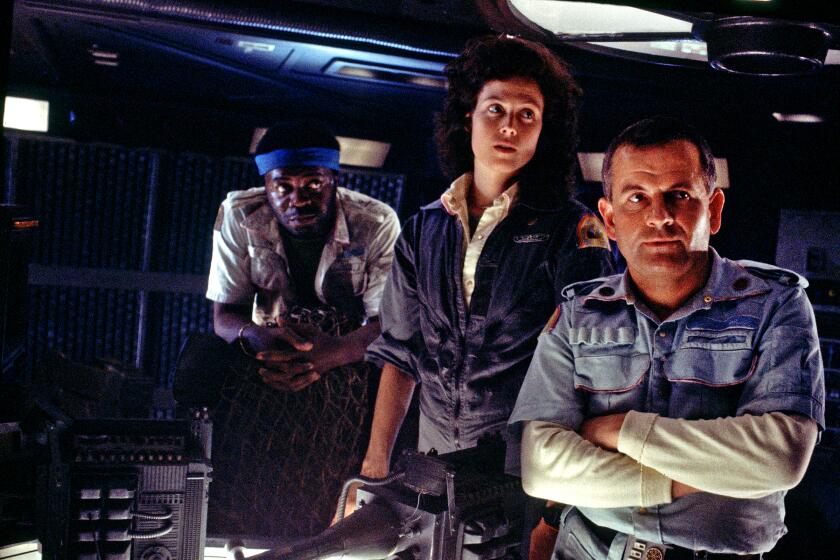Will Ferrell and Adam McKay have made a movie about the Lakers and sex
Adam McKay, the director of “The Big Short” and the producing partner of Will Ferrell, had a theory on why some of his collaborator’s films have worked better than others.
“Ferrell had a period, due to an injury, in which he stopped all carnal relations,” McKay said in a joint phone interview with the actor this week. “It was about 10 years ago. Look at the films that came out of that time - ‘Old School,’ ‘Talladega Nights,’ so many good ones. And then he healed and look at what happened.”
Ferrell wasn’t buying it. “I think it was because I stopped eating pork. That was a much bigger factor,” he said. “I just stopped completely.”
“You were totally halal back then,” agreed McKay quietly.
The two had reason to be thinking about abstemious behavior. They had just finished working on “A.C. Green: Iron Virgin,” a short for ESPN’s 30 for 30 series about the famous -- and famously celibate -- Laker All-Star.
Directed by Isaac Feder, “Green” follows the -- what’s the opposite of colorful? -- exploits of the power forward.
As Lakers fans of a certain age know, Green was the upstart on the Showtime teams of the 1980s. Drafted 23rd overall in 1985, he joined in time for the titles in the 1986-1987 and 1987-1988 seasons, averaging in double figures over the two seasons.
McKay executive produced and Ferrell narrated the film, which features voices such as James Worthy, Jerry West and Kareem Abdul-Jabbar, as well as Green himself. (The short has just gone online and can be viewed here; it will air on ESPN later this week.)
The short examines Green’s unlikely streak -- after missing three games in his second season due to surgery, he would never sit out again, playing through thick and thin. (“Why miss? What was I supposed to sit out for or not play for?” he says in the film) That stretched all the way to his retirement in 1997 -- a span of 1,192 games. The spell was made more remarkable because of Green’s aggressive, board-crashing style of play.
Maybe even more impressive, given the partying culture surrounding the Lakers at the time, was another Green streak: He remained a virgin through all his years with the team, and in fact through his whole career. An intensely devout Christian, he would bring his Bible wherever he went and was both celibate and sober. (There’s a great clip after a title victory when Champagne bottles were handed to team members as they entered the locker room. Magic Johnson takes one and begins to celebrate; Green takes one and quickly, stealthily puts it down.)
Fellow Lakers used to even send interested groupies to Green’s hotel room in the hope of leading him to temptation, but their shots missed the mark. (He ended his chastity when he married -- upon retirement.) When young women would fawn over him, he would try to teach them the Bible. Green would as surely stay out of trouble as he would reliably come out on the court the next day.
It’s hard not to wonder if those two are related, not least because Green’s aggressive style suggested a man with a lot of pent-up energy. The thought occurred to the filmmakers too.
“It just saved you a lot of time if you’re not out partying,” McKay said. “You’re certainly well-rested, and that can help you on the court.”
“Then again, look at Magic,” Ferrell said reasonably.
(Green, who was extremely aggressive as a player, saw religion and hoops as connected: “I think Jesus would have been the kind of player that was unstoppable.”)
Neither McKay nor Ferrell were star basketball players. “I tried to say adding 30 pounds was my religion -- that my belief system was eating gravy fries late at night, but my coach didn’t believe it,” McKay said.
They began thinking about the possibilities of a Green movie, though, when a colleague at their Gary Sanchez Productions took McKay to a Clippers game and began talking about the richness of the story. They were also motivated by their Lakers and general fandom; indeed, “Iron Virgin” almost seems almost like a ready-made Ferrell sports spoof. (Think of the awkward romantic interactions. Think of the rivals.)
The actor, who has sent up Olympic figure skating, youth soccer and ABA basketball, said he’s not sure he’s interested in returning to sports-movie terrain any time soon.
He did, however, have some theories about what ails the current Lakers.
“Part of what I think the issue is is that you can be a star anywhere these days; you don’t need to come to Los Angeles,” Ferrell said. “That’s a real problem.”
McKay wondered if the hurdles were high for the Lakers, but said he saw some rays of hope. “I think if Oklahoma City doesn’t winb Kevin Durant might say ‘it’s time to make a move,’” he said, alluding to the impending free agent. “It all comes down to the Spurs series.”
Then they started debating other sports figures who would make a good movie.
“Arian Foster is an atheist.”
“Is he?” Ferrell said.
“He’s really articulate and outspoken,” McKay said, referring to the NFL running back. “We could do something with him. Make it a series.”
Like “The Big Short,” but with religion and sports?
“Exactly.”
More to Read
Only good movies
Get the Indie Focus newsletter, Mark Olsen's weekly guide to the world of cinema.
You may occasionally receive promotional content from the Los Angeles Times.











